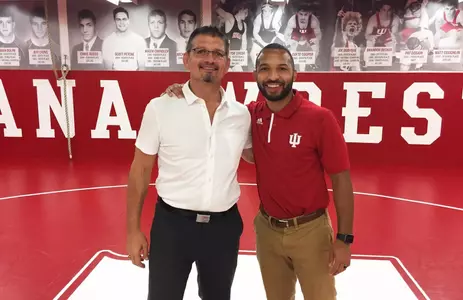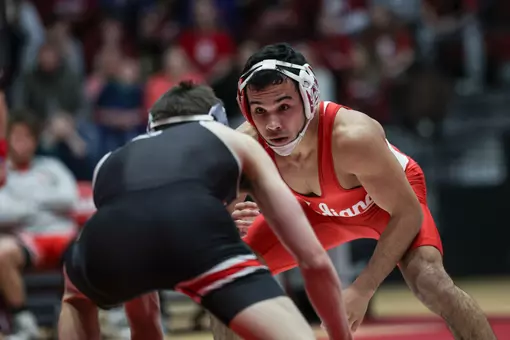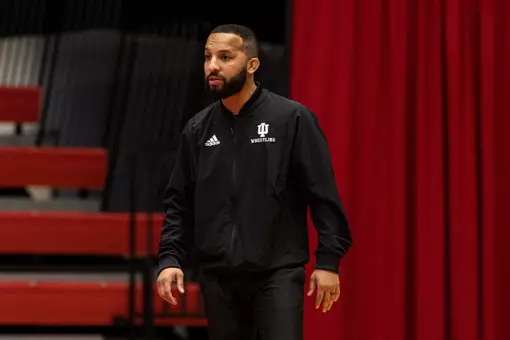Indiana University Athletics

Former IU Wrestling Champion Thrives as Difference-Making Entrepreneur
3/26/2025 10:30:00 AM | Wrestling
BLOOMINGTON, Ind. -- Saving lives and helping people is Jim Pearson's business.
How this former Indiana University wrestling champion got there, how he became a successful entrepreneur in the medical field with ground-breaking brain surgery innovations, starts with the toughness, discipline and resilience sports develops so well.
"Success is more than just raw intellect," says Pearson, currently a Neurosurgery Division consultant for Stryker Corporation, a world leader in medical technologies. "You need the fundamentals that sports give you."
As the president, CEO and co-founder of Indianapolis' NICO Corporation, Pearson helped develop a minimally invasive neurosurgery system to access and remove tumors and stroke-causing blood clots that has helped more than 50,000 patients. It's a device, about the size of a pen, that cuts up and vacuums out tumors and blood clots. In some cases, patients can have surgery and return home in a few days.
It is, in effect, arthroscopic surgery for the brain.
"It's the hardest thing I've ever done, that hardest thing the company had ever done," Pearson says. "It changed (brain) care."
The company targeted hemorrhagic strokes, which occur when a blood vessel in the brain ruptures and bleeds into the surrounding tissue. Pearson says with no proven surgical answer until NICO's 1st ever positive surgical trial for this disease was published in The New England Journal of Medicine in 2024, patients simply had no surgical option. Up to 50% would die immediately and if you survived 80% would have permanent deficits.
"It was the most deadly and costly stroke since the dawn of time," he says. "If doctors could get in there early enough, they could take out the clot and patients could get better. Convincing neurosurgeons took a lot of confidence, stamina and adaptability."
Wrestling-honed discipline and tenacity helped make it possible. It came from Pearson's philosophy that reward often comes from risk, that failure from not being good enough is acceptable, but failure from lack of preparation is not.
Pearson thrives from the premise that sometimes failure is the best option if you learn from it, grow from it, and use it to make a difference.
Pearson has. His difference-making impact over a nearly 30-year entrepreneur career reflects the best of IU, its athletic programs and, in this case, of its wrestlers, says Hoosier wrestling coach Angel Escobedo.
"Think of the impact he's had with the way we do brain surgeries," Escobedo says. "He changed the way doctors operate. It shows what a wrestler from this program can do and how he can have world impact. It's incredible."
Impact came from struggles. Pearson failed at two business ventures. At IU, the psychology major failed to win a national title or earn All-America status, although he did win the 158-pound Big Ten championship in 1990 while helping the Hoosiers to a Big Ten runner-up team finish. He also attempted to make the 1992 Olympic wrestling team training at Team Foxcatcher before entering the business world.
Pearson says wrestling helped him develop self-confidence, curiosity and adaptability, stamina and problem-solving skills.
"If I say I will do something, I will go at it with everything I have. If I fail, try again. If you understand why you failed, if you can adapt and progress, if you have the stamina to keep working, you might not fail the next time. You have to believe in yourself, be adaptable and go at it long enough to get what you want."
****
Pearson grew up poor in a single-mother family. He thrived in wrestling and, as a senior at Centerville High School in Ohio in 1985, was an undefeated state champion. That got the attention of IU wrestling coach Jim Humphrey, who offered a scholarship. Humphrey went on to coach the 1988 U.S. Olympic freestyle wrestling team and is a member of the National Wrestling Hall of Fame.
"If IU hadn't come to me, there's no way I would be doing what I'm doing," Pearson says. "I probably wouldn't have gone to college."
He went on to win that 158-pound Big Ten title for a 1990 Hoosier team that finished second to Iowa in the Big Ten meet and placed eighth nationally.
"I was on a great IU team with a lot of hard-working people," Pearson says.
His college wrestling career ended with a double overtime loss in the NCAA quarterfinals. One victory away from earning All-America honors, a mistake cost him the match.
"I had nightmares forever. It taught me not to make dumb mistakes and to be more prepared."
Pearson then competed internationally and tried out for the 1992 Olympics, ultimately placing eighth at the U.S. Open in Freestyle.
"They only took one guy, so clearly I wasn't close to making the team," he says. "I thought to myself, I can try to make it in 1996 and be too old and not good enough, or get a job as a sales rep in the medical field."
Pearson stays close to IU's wrestling program and Escobedo, providing financial and other support. The Hoosiers finished 8-5 in dual meets. They have won at least seven dual matches in each of the past three seasons.
The team finished tied for 24th place at the NCAA Championships this past week with DJ Washington earning All-American honors as an 8th place finisher at 184 lbs.
"He's done an awesome job with the program," Pearson says.
*****
Pearson found his entrepreneurship calling the hard way. In the late 1990s, he was vice president of sales and marketing for a medical equipment company, married with a second child on the way, plus building a house, when the business went bankrupt.
"I go to work one day, and the door is locked," he says. "It was like, oh, (shoot), what do I do?"
He started his own medical equipment distributor company for ultrasound, laser and surgical devices, then became a senior vice president for a California-based company, invested heavily in that, and lost everything when it, too, went out of business.
"It was like, 'Wow, when you chase the wrong things and don't build value in the business, it can go bad.'"
Pearson learned, came to Indianapolis to raise money and, in 2001, became president and CEO of Suros Surgical Systems, which manufactured and distributed minimally invasive biopsy and tissue removal devices. He raised $20 million. The company was sold in 2006 for $288 million. In 2007, he co-founded and became president and CEO of NICO Corporation. Stryker Corporation bought NICO last September. Pearson is now a consultant for its neurosurgery division.
Pearson has also been a volunteer wrestling coach at several Indianapolis area high schools and is on the board of the Indiana Chapter of Wrestlers in Business, a national non-profit networking group that helps advance wrestlers' careers.
Is starting another business in his future?
"I want to do things that matter and where I contribute and grow," he says. "I don't know what will be next."
How this former Indiana University wrestling champion got there, how he became a successful entrepreneur in the medical field with ground-breaking brain surgery innovations, starts with the toughness, discipline and resilience sports develops so well.
"Success is more than just raw intellect," says Pearson, currently a Neurosurgery Division consultant for Stryker Corporation, a world leader in medical technologies. "You need the fundamentals that sports give you."
As the president, CEO and co-founder of Indianapolis' NICO Corporation, Pearson helped develop a minimally invasive neurosurgery system to access and remove tumors and stroke-causing blood clots that has helped more than 50,000 patients. It's a device, about the size of a pen, that cuts up and vacuums out tumors and blood clots. In some cases, patients can have surgery and return home in a few days.
It is, in effect, arthroscopic surgery for the brain.
"It's the hardest thing I've ever done, that hardest thing the company had ever done," Pearson says. "It changed (brain) care."
The company targeted hemorrhagic strokes, which occur when a blood vessel in the brain ruptures and bleeds into the surrounding tissue. Pearson says with no proven surgical answer until NICO's 1st ever positive surgical trial for this disease was published in The New England Journal of Medicine in 2024, patients simply had no surgical option. Up to 50% would die immediately and if you survived 80% would have permanent deficits.
"It was the most deadly and costly stroke since the dawn of time," he says. "If doctors could get in there early enough, they could take out the clot and patients could get better. Convincing neurosurgeons took a lot of confidence, stamina and adaptability."
Wrestling-honed discipline and tenacity helped make it possible. It came from Pearson's philosophy that reward often comes from risk, that failure from not being good enough is acceptable, but failure from lack of preparation is not.
Pearson thrives from the premise that sometimes failure is the best option if you learn from it, grow from it, and use it to make a difference.
Pearson has. His difference-making impact over a nearly 30-year entrepreneur career reflects the best of IU, its athletic programs and, in this case, of its wrestlers, says Hoosier wrestling coach Angel Escobedo.
"Think of the impact he's had with the way we do brain surgeries," Escobedo says. "He changed the way doctors operate. It shows what a wrestler from this program can do and how he can have world impact. It's incredible."
Impact came from struggles. Pearson failed at two business ventures. At IU, the psychology major failed to win a national title or earn All-America status, although he did win the 158-pound Big Ten championship in 1990 while helping the Hoosiers to a Big Ten runner-up team finish. He also attempted to make the 1992 Olympic wrestling team training at Team Foxcatcher before entering the business world.
Pearson says wrestling helped him develop self-confidence, curiosity and adaptability, stamina and problem-solving skills.
"If I say I will do something, I will go at it with everything I have. If I fail, try again. If you understand why you failed, if you can adapt and progress, if you have the stamina to keep working, you might not fail the next time. You have to believe in yourself, be adaptable and go at it long enough to get what you want."
****
Pearson grew up poor in a single-mother family. He thrived in wrestling and, as a senior at Centerville High School in Ohio in 1985, was an undefeated state champion. That got the attention of IU wrestling coach Jim Humphrey, who offered a scholarship. Humphrey went on to coach the 1988 U.S. Olympic freestyle wrestling team and is a member of the National Wrestling Hall of Fame.
"If IU hadn't come to me, there's no way I would be doing what I'm doing," Pearson says. "I probably wouldn't have gone to college."
He went on to win that 158-pound Big Ten title for a 1990 Hoosier team that finished second to Iowa in the Big Ten meet and placed eighth nationally.
"I was on a great IU team with a lot of hard-working people," Pearson says.
His college wrestling career ended with a double overtime loss in the NCAA quarterfinals. One victory away from earning All-America honors, a mistake cost him the match.
"I had nightmares forever. It taught me not to make dumb mistakes and to be more prepared."
Pearson then competed internationally and tried out for the 1992 Olympics, ultimately placing eighth at the U.S. Open in Freestyle.
"They only took one guy, so clearly I wasn't close to making the team," he says. "I thought to myself, I can try to make it in 1996 and be too old and not good enough, or get a job as a sales rep in the medical field."
Pearson stays close to IU's wrestling program and Escobedo, providing financial and other support. The Hoosiers finished 8-5 in dual meets. They have won at least seven dual matches in each of the past three seasons.
The team finished tied for 24th place at the NCAA Championships this past week with DJ Washington earning All-American honors as an 8th place finisher at 184 lbs.
"He's done an awesome job with the program," Pearson says.
*****
Pearson found his entrepreneurship calling the hard way. In the late 1990s, he was vice president of sales and marketing for a medical equipment company, married with a second child on the way, plus building a house, when the business went bankrupt.
"I go to work one day, and the door is locked," he says. "It was like, oh, (shoot), what do I do?"
He started his own medical equipment distributor company for ultrasound, laser and surgical devices, then became a senior vice president for a California-based company, invested heavily in that, and lost everything when it, too, went out of business.
"It was like, 'Wow, when you chase the wrong things and don't build value in the business, it can go bad.'"
Pearson learned, came to Indianapolis to raise money and, in 2001, became president and CEO of Suros Surgical Systems, which manufactured and distributed minimally invasive biopsy and tissue removal devices. He raised $20 million. The company was sold in 2006 for $288 million. In 2007, he co-founded and became president and CEO of NICO Corporation. Stryker Corporation bought NICO last September. Pearson is now a consultant for its neurosurgery division.
Pearson has also been a volunteer wrestling coach at several Indianapolis area high schools and is on the board of the Indiana Chapter of Wrestlers in Business, a national non-profit networking group that helps advance wrestlers' careers.
Is starting another business in his future?
"I want to do things that matter and where I contribute and grow," he says. "I don't know what will be next."
IUWBB Highlights vs. ULM
Friday, December 12
Darian DeVries Pregame Press Conference
Thursday, December 11
FB: Curt Cignetti - Pre-Heisman Press Conference
Thursday, December 11
IUBB Postgame Press Conference
Wednesday, December 10




